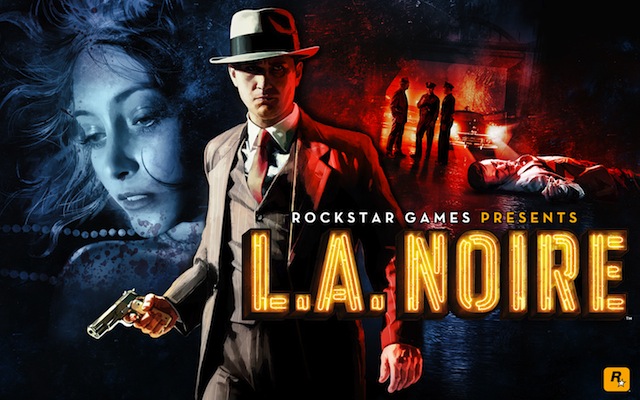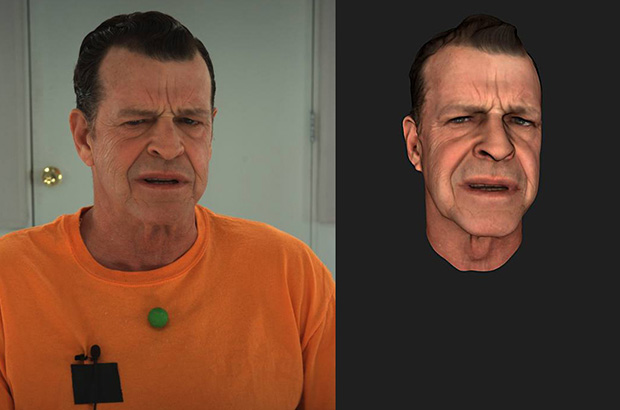Last updated on March 4, 2013
Honestly, I’m trying to figure out why L.A. Noire actually works! Let’s say I’m not too big a fan of the “interactive movie” style, yet I really think L.A. Noire has a great handle on how this thing should work. Of course, the key is “interactive”, and not movie. That’s why Heavy Rain fails – by not playing like a game in any way, it doesn’t give the player any reason to invest their emotions in the story. L.A. Noire, on the other hand, does this perfectly, and with (from my view) little fanfare. The game puts you into the shoes of an honest-to-goodness detective from the late 1940s, and you do exactly what the technology of the time allowed you to do – no DNA, no security cameras, just some natural good sense and deductive reasoning (both of which I have neither). That’s great! I like this; I was never a fan of adventure games, simply because the logic and reasoning behind the sequences was mostly a one-off, and divining the developer’s intentions wasn’t fun at all – it was frustrating.
Team Bondi has taken advantage of a variety of genres, as well as its GTA predecessors (for all its historical posturing, it’s just an interesting overlay onto the GTA formula, not that this is a bad thing in itself). First, you have the adventure game segments – these involve searching around an area of interest for clues, usually a crime scene or something related to it. Can you believe somebody revived adventure games for a brief moment? Certainly, they’re out there, but they don’t look or play quite like this. Because I’m up for a challenge, I turned off the musical cues that play when you’re near an important item, and allowed myself the ability to pick up “red herring” – items that don’t do anything for the case at all, and exist solely to waste your time. I wish Cole wouldn’t point out that they are useless, but you can’t win at everything. Usually, these item gathering segments work together with the interrogations – given the valid clues, evidence, and information at the scene, your job is to find out whether the subject’s story lines up with the facts. Even if you turn music cues off, you can gather every single piece of evidence and still not know exactly the right story. You need to pay attention if you want to get it right, and you can usually tell by the interviewee’s facial expressions what is actually going on, or at least to press them on their story.
And you can genuinely tell! When they said the facial technology was realistic, they weren’t kidding. Little facial tics and social elements work perfectly because, well, they recorded real facial expressions. It’s marvelous, and really adds to the idea that you’re in a real world. It definitely dips into the uncanny valley in spots, but that’s fine – it’s just reminding me that what transpires onscreen still remains in the digital realm. I’ve always wondered why people complain about this when it seems, in most cases, to be an element of art design or choice rather than necessity. L.A. Noire tries to capture film noire stylings, for example, so it’s never going to be absolutely perfect in the visual department. It’s just enough to know that the game wants me to examine their faces closely, catch a glimpse of a lie, and then find out the truth!
Over time, you’ll find that the overarching plot of Cole Phelps finds its way in every portion of the game. It’s “role-playing” in the truest sense, and as the details of each case pile up, you find yourself totally invested in the conclusion of the story, which may come as a total surprise or as an excellent series of guesses on your part – either way, the payoff truly is excellent for each little episodic vignette. It does make up for the fact that the running and shooting controls aren’t the best – they’re functional, but they don’t hold a candle to any decent action shooter of the past decade or so. Rather, even if these segments are mediocre, they play a role in the outcome of the case, and you need to see justice done! I like playing the righteous character in a Rockstar game for once – the good guys get to have some of the spotlight, and they pull it off well.
Let me talk a little more about the shooting, driving, and running, though. I am playing the PC version, currently, but I find the driving to be less than superb; it’s just wonky and odd, and the fact that you take score penalties for hitting objects (or people, maybe?) in the environment has to be one of the weird things I encountered in a video game. Sure, you’re a detective of the law, but this is still a video game, and penalizing me for driving poorly in a GTA style is a weird design choice. It’s almost as if Team Bondi wanted me to skip these segments…which, you can! Shouldn’t it worry you that you can skip segments of a game because they’re too challenging? What the heck is wrong with people? Why bother watching it when you could just watch a movie? I removed my ability to skip because, even if the game is easy, I wanted to earn the next segment of the story; to be part of the experience and interact with it does loads more for immersion than skipping a driving sequence because of my lack of skill. Trial and error is fun! Skipping parts of a game is not fun! Plus, L.A. isn’t particularly memorable after a few long 15 minute drives between mission segments – it’s just tedious, and unlike GTA, you never get a good sense of where you are. It’s a shame, really, that all this open-world stuff in L.A. Noire isn’t neccessary for the end-product, as it’s obvious a lot of work went into crafting this world. They would have been better off making a linear experience that focuses on the good parts while removing these extraneous elements.
Furthermore, you can’t lose the interrogations so much as you get “negative points” on your score. Problem is, who in their right mind plays this game for score, or would replay a segment simply to augment their previous score? There isn’t replay value because the action game portions of the project aren’t up to snuff, and redoing these storylines doesn’t add much to the experience of the first time. If you already know who is guilty, it devolves into a game of trying to figure out what the exact right answers are, and that doesn’t seem like Team Bondi’s intention, by any means. Even when you do particularly bad on a case – the police chief yells at you and tells you how bad a cop you really are – the game acts like nothing happened last time! I think branching patsh would’ve done a lot to add to the storytelling; as of now, it feels as if they’re pushing me through their story, their content, simply because they don’t want me to become frustrated. Frankly, the jarring transitions removed by suspension of disbelief entirely; I knew I was playing a game and they were going to let me pass, regardless of how poorly I performed. That’s resignation, not triumph.
This is exactly the kind of game I should hate, yet I can’t help but enjoy it immensely. The overall experience reeks of quality, but everything taken in individual portions just begs for a little more intelligent game design. Much of this, then, comes down to immersion. I can’t imagine myself as a crime committing psychopath – that’s why GTAIV doesn’t work for me at all in most respects. The earlier GTA games I can accept because they’re the equivalent of a digital playground with some raunchy humor for good measure – the realism of GTAIV turns me off, though. However, I can be Cole Phelps, fighting against the underworld one case at a time. Even he sees, and remarks, that the people committing these crimes are messed up, but he has a past just like anyone else, something relatable. Niko Bellec isn’t someone I can relate to, purely because he’s a video game character in a realistic world.
Hey, even the righteous people of the Bible weren’t all angelic figures and paragons of virtue (excluding Jesus, who was more than human, obviously!). Moses was a murderer, a coward, and a purveyor of white lies. Heck, Exodus 2 has to be the most bizarre thing to include in a story ever to gain sympathy. Or is it revulsion?
11 One day, after Moses had grown up, he went out to where his own people were and watched them at their hard labor. He saw an Egyptian beating a Hebrew, one of his own people. 12 Looking this way and that and seeing no one, he killed the Egyptian and hid him in the sand. 13 The next day he went out and saw two Hebrews fighting. He asked the one in the wrong, “Why are you hitting your fellow Hebrew?” 14 The man said, “Who made you ruler and judge over us? Are you thinking of killing me as you killed the Egyptian?” Then Moses was afraid and thought, “What I did must have become known.” 15 When Pharaoh heard of this, he tried to kill Moses, but Moses fled from Pharaoh and went to live in Midian, where he sat down by a well.
So he murders a guy and runs away – real smooth. That’s developing a character in a narrative, but it also really happened! That it’s described so nonchalantly and never again just speaks to the kind of people God will use to fulfill His purposes – just about anybody with a willing heart. Not that Moses was willing, but God won him over.
Peter couldn’t stand a few rounds in the persecution seat and he had a lot of trouble with peer pressure; Jeremiah was undoubtedly depressed and confused for the majority of his life, and the same could go for Ezekiel as well. Jacob was a bit of a backstabbing traitor to his brother. These aren’t perfect people – heck, we aren’t either. A story can’t include something that doesn’t make sense and characters that don’t exhibit realistic tendencies. A flawed protagonist does infinitely more than one that exhibits elements of perfection (Jesus, obviously, excluded). Even a true story like the Bible tells its tale in a narrative form, and that’s why I can relate and understand it and what it reveals about how God works.
L.A. Noire, then, can immerse the player and engage them because one fights for justice even in the face of overwhelming odds of a corrupt city. Heck, it works for me, and it should work for you too. And John Noble’s in it!


